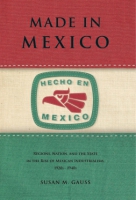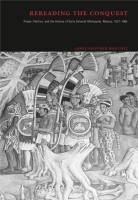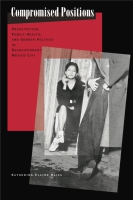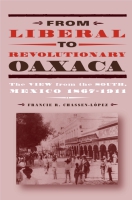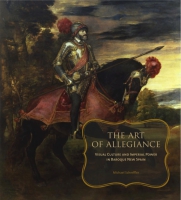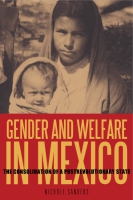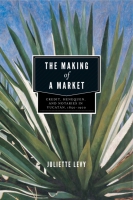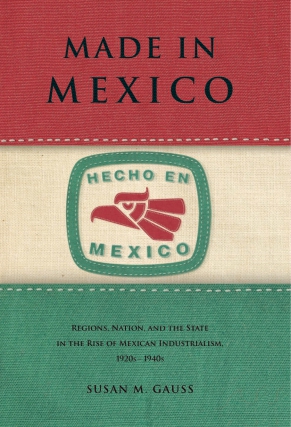
Made in Mexico
Regions, Nation, and the State in the Rise of Mexican Industrialism, 1920s–1940s
Susan M. Gauss
Made in Mexico
Regions, Nation, and the State in the Rise of Mexican Industrialism, 1920s–1940s
Susan M. Gauss
“Bucking the culturalist trend of much recent Mexican historiography, Gauss gives us an ambitious and cogent analysis of the postrevolutionary political economy, combining a perceptive national overview with illuminating regional case studies, the whole based on extensive original research, lucidly deployed. Among the best recent monographs on modern Mexico, the book sheds light on national politics, state-building, foreign relations, and the role of the PRI, business, and organized labor in forging the new Mexico of the postwar era.”
- Description
- Reviews
- Bio
- Table of Contents
- Sample Chapters
- Subjects
The image of a strong, centralized corporatist state led by the Partido Revolucionario Institucional (PRI) from the 1940s conceals what was actually a prolonged, messy process of debate and negotiation among the postrevolutionary state, labor, and regionally based industrial elites to define the nationalist project. Made in Mexico focuses on the distinctive nature of what happened in the four regions studied in detail: Guadalajara, Mexico City, Monterrey, and Puebla. It shows how industrialism enabled recalcitrant elites to maintain a regionally grounded preserve of local authority outside of formal ruling-party institutions, balancing the tensions among centralization, consolidation of growth, and Mexico’s deep legacies of regional authority.
“Bucking the culturalist trend of much recent Mexican historiography, Gauss gives us an ambitious and cogent analysis of the postrevolutionary political economy, combining a perceptive national overview with illuminating regional case studies, the whole based on extensive original research, lucidly deployed. Among the best recent monographs on modern Mexico, the book sheds light on national politics, state-building, foreign relations, and the role of the PRI, business, and organized labor in forging the new Mexico of the postwar era.”
“The strength of [Made in Mexico] is the author’s research in the state archives of Jalisco, Nuevo Léon, and Puebla. Gauss constructs the history of relations among the economic elites of the three main industrial areas outside the capital (Guadalajara, Monterrey, and Puebla), the state governments, and the central government in Mexico City. . . . The author is quite adept at sorting out the complex relations between the various levels of government and the three groups of regional industrialists, showing how they tied into the shifting politics and economic exigencies of the era.”
“Made in Mexico is a very important book that fills a number of gaps in the literature on postrevolutionary Mexico by tracing the national and regional development of the country's industrial sector. The book, which explores the conflicts among industrialists and labor leaders as well as state and federal policy makers over statist industrialism, is well written, thoroughly researched, and rests firmly on materials from Mexico City’s national depositories as well as the state archives of Jalisco, Nuevo León, and Puebla.”
“The relationship between state, capital and labour has a seminal place within the scholarship of Latin America’s statist political economy. Made in Mexico adds the dynamic variable of regionalism to the literature, which provides an important revision to traditional understandings of the Mexican case. . . . Gauss’s important study . . . illustrates how divergent industrial sectors and their particular histories of capital formation, from textiles to glass-making, generated Mexico’s many paths toward statism.”
Susan M. Gauss is Assistant Professor of History and Latin American, Caribbean, and U.S. Latino Studies at the University at Albany, SUNY.
Contents
Acknowledgment
Abbreviations
Introduction
1. The Politics of State Economic Intervention from the Revolution to the Great Depression
2. “Jalisco, Open Your Arms to Industry”: Industrialism and Regional Authority in
Guadalajara in the 1930s and 1940s
3. The Passion and Rationalization of Mexican Industrialism: Rival Visions of State
and Society in the Early 1940s
4. Sowing Exclusion: Machinery, Labor, and Industrialist Authority in Puebla in the 1940s
5. The Politics of Nationalist Development in Postwar Mexico City
6. Recentering the Nation: Industrial Liberty in Postrevolutionary Monterrey
Conclusion
Bibliography
Index
Introduction
On October 21, 1952, President Miguel Alemán (1946–1952) enacted a decree mandating that all clothing manufactured for domestic consumption carry a label stating “Hecho en México” and giving the product’s region and factory of origin.1 The provenance of the “Hecho en México” decree dated to 1927, when officials and producers perceived a crisis of consumer confidence in domestic goods.2 Officials in 1952 also cited quality and consistency problems when explaining consumer preference for imported goods. However, industrialists offered other explanations. Leaders of the National Chamber of Manufacturing Industry (Cámara Nacional de la Industria de Transformación, CANACINTRA), dominated by consumer manufacturers in Mexico City, instead pointed to cultural and psychological causes. In particular, they condemned the “Malinche complex,” arguing that it led Mexican consumers to scorn nationally made goods in favor of foreign manufactures, even when they were of equal price and quality. Even more shameful, they complained, were the mercenary merchants who profited from this national affliction by actively encouraging the consumption of imported goods. CANACINTRA spokesmen concluded that the solution lay not in changes to prices or quality, but in the cultivation of a “national mystique that would convince consumers that whatever immediate sacrifice they would have to make by consuming nationally produced goods, even in terms of lower quality or higher prices, would soon bring economic independence and a considerable improvement in standards of living for all Mexicans.”3 Although increased consumption of Mexican-made goods certainly would bring these manufacturers greater profits, their goal was to convince people that industrial development would eventually benefit all Mexicans.
The Alemán administration censured producers, especially textile manufacturers, for concealing the origins of their wares in an effort to raise prices on low-quality goods.4 The 1952 decree, as well as its predecessors, included provisions for fines and even imprisonment for producers who failed to label their goods as products of Mexico.5 Many scholars portray the Alemán administration as the highpoint of an alliance between the state and the national bourgeoisie that underpinned Mexico’s “miracle” of midcentury economic growth and state power. Therefore, the 1952 decree is revealing because it shows that ruling-party officials still viewed industrialists as a threat to their project for statist industrialization.
Perceptions of this threat were not chimerical. They can be traced to postrevolutionary conflicts over regional variants of industrial development that arose between the state and industrialist and labor groups in Guadalajara, Mexico City, Monterrey, and Puebla. These competing industrial visions often lay bare regional industrialists’ preoccupation with preserving aspects of local political power and managerial authority over labor-employer relations in the face of an increasingly interventionist state. This book traces these conflicts and visions in order to explore how mid-twentieth-century state-led industrialism evolved as a fairly flexible, nationalist political project that encompassed the state’s distinct relationships with regional industrialists based on accommodation, collaboration, and exclusion. These relationships, in turn, contributed to the consolidation of a stable ruling party during much of the rest of the century.
In this light, the 1952 decree appears as part of a broader crusade by the ruling party to unite producers and consumers behind the party’s goals for statist development. After World War II, President Alemán initiated the Campaign for Economic Recovery (Campaña de Recuperación Económica), a widely supported campaign for economic development whose key missions were independence and collective welfare. These could be accomplished, President Alemán argued, by improving the quality of nationally manufactured goods in order to supplant the high-quality, low-priced imports flooding into Mexico and eating up its postwar monetary reserves.6 To encourage support for the campaign, President Alemán linked it to the postrevolutionary cultural project of mexicanidad (mexicanness). Originally, mexicanidad had been framed to address the political and social turmoil that attended the reconstruction of the state and society after the violence of the Revolution. Its architects had sought to foster unity built upon conceptions of a national character defined by a common psychological and spiritual condition and located in Mexico’s rural, agrarian roots.7 Unlike earlier versions of mexicanidad, however, pride in national production and consumption of modern manufactured goods became the essence of President Alemán’s definition. The campaign therefore proposed “to incorporate fifteen million Mexicans into the economic life of the nation” and to instruct them on the virtues of savings and responsible consumption. It also condemned the immoral and rapacious behavior of some merchants and industrialists whose actions betrayed the nation.8 By tapping into the revolutionary and nationalist genealogy of mexicanidad, President Alemán promoted the potential of statist industrialism to achieve social justice and collective welfare. He concurrently affirmed the legitimacy of the claims by the ruling Institutional Revolutionary Party (Partido Revolucionario Institucional, PRI) that it was leading the moral and material regeneration of the Mexican nation.
President Alemán’s conception of mexicanidad, as with all assertions of national identity, divulged more about its proponents’ aspirations than about any sort of genuine national character or affinities. It ascribed a stability and uniformity to the Mexican industrial experience based on abstract ideas about economic independence, national regeneration, and collective welfare. Yet, the rival visions of political authority and modern social relations that influenced debates about industrialization among industrialists, labor, and the state between the 1920s and the early 1950s belied this official version of midcentury industrialism. Mexicanidad therefore helped to mask the fact that statist industrialism, although a nationalist project, was hardly a national one.
President Alemán was able to cast mexicanidad as a project for national economic recovery and moral regeneration because of the endorsement for protected industrialization he received from CANACINTRA and the Confederation of Mexican Workers (Confederación de Trabajadores de México, CTM). The leaders of CANACINTRA and the CTM supported President Alemán in part because they believed in the power of the state to resolve a looming postwar economic crisis and repress labor radicalism. They also viewed an alliance with the PRI as a means to secure official sanction for their influence over national industry and labor. In return, the alliance provided the ruling party with critical backing as it struggled to contain challenges from an array of labor and industrialist groups. It also enabled the state to pursue types of protected development that justified state economic intervention on a scale never before seen in Mexico’s national history. In the process, the alliance helped to portray as a national phenomenon a version of statist industrialism largely derived from the urban industrial experience in the capital.10
After the Revolution, the political and ideological bankruptcy of late nineteenth-century economic liberalism and, by the 1950s, the rising influence of structuralists across Latin America secured the nationalist credentials of this pro-protectionist alliance.11 It was also sustained by the apparent limits of postrevolutionary agrarianism as a project for political pacification and economic growth. Betraying those limits were persistent poverty, social unrest, rural-to-urban migration, and electoral fraud that outlasted the 1930s reforms. In this climate, industrialization appeared to be a way to free Mexico from revolutionary turbulence, economic backwardness, paternalism, and Catholic provincialism, which many technocrats and politicians believed were continuing to burden the country. Protectionist policies, including trade controls and tariffs, therefore became more than simply a means to enhance revenue or develop industry. They became the cornerstone of ruling-party efforts to forge political unity, achieve economic independence from the United States, and improve national standards of living. Protected industrialization, in turn, helped to spur Mexico’s dramatic social, cultural, and economic transitions of mid-twentieth-century Mexico. As industry emerged as a motor of the Mexican economy, agriculture declined in relative importance. Mexico consequently changed from a predominantly rural, agrarian country to one that by the 1970s was largely urban, literate, and industrial. With these social and cultural transformations in mind, in this book “industrialism” does not denote solely the economic changes and transformations in the material basis of production that constituted the historical process of “industrialization.” The use of “industrialism” here seeks also to capture and highlight the intellectual culture and popular mentalities that underpinned the different forms of political rule and modernizing social changes that also constituted industrialization.12 Additionally, the dramatic expansion of the regulatory aims of the Mexican state after the Revolution and especially beginning in the late 1940s marked a departure from prior levels of state economic intervention, even if the state’s capacity or will to direct industrialization remained uneven. Therefore, although the state has always influenced industrialization in some measure, this study refers to “statist” industrialism to emphasize this rupture and to underscore its political and social character.
For many social scientists, the domestic political and social influences behind the rise of Import Substitution Industrialization (ISI) are less significant than the global forces that they argue compelled much of Latin America to protect industry more aggressively in the middle of the twentieth century.13 Most have mapped the rise of ISI as coming out of the ashes of the Great Depression or World War II. Some have portrayed it as a “healthy” or “natural” stage of modernizing development or the result of cumulative shocks, dwindling trade options, missed opportunities, monetary concerns, or structural distortions and rigidities that prevented Latin American economies from responding to market cues.14 For example, Enrique Cárdenas emphasized the Great Depression as being the first major shock to the export-oriented model of growth that had dominated in Latin America since the nineteenth century. According to Cárdenas, however, World War II provided the impetus for a maturation of Depression-era “spontaneous” import substitution into a conscious project to develop industry that would replace imports.15 For others, World War II itself was the tipping point. Some called attention to a postwar “export pessimism” sparked by concerns about the devastation of former primary product markets in Europe and influenced by the writings by the Economic Commission for Latin America (ECLA) about the secular decline of Latin America’s terms of trade.16 Others, such as Rosemary Thorp, agreed that World War II caused a global disturbance in trade that exposed the vulnerability of export-led growth. Thorp added, however, that the difficulty of obtaining needed imports during the war was also a key factor spurring ISI.17 By contrast, although others agreed that the Great Depression significantly influenced banking and commerce and prompted more state intervention, they found its impact on the rise of ISI across Latin America to be on a par with other factors reaching back to the nineteenth century.
Together these varied accounts have evinced the broader economic determinants that have driven ISI as a historical process in Latin America. Structuralists from ECLA also noted these similarities, for example, by stressing the critical role of foreign-exchange constraints in encouraging ISI. However, as a developmental model to counteract midcentury economic crises, ISI has not been particularly agile when accounting for the distinct political and social trajectories attending protected industrialization across Latin America.19 By emphasizing Mexico’s relatively open economy and its unique postrevolutionary state, some scholars have already pinpointed the ways in which its experience diverged from the ECLA model.20 But also distinguishing ISI in Mexico were its revolutionary origins, which made Mexico’s politicians, technocrats, and industrialists ambivalent about accepting any rigid foreign economic models. Instead, they drew from a range of economic ideas derived from both international schools of thought and Mexico’s domestic experience. This intellectual heterodoxy is especially significant since the division between economic liberals and protectionists in Latin America has often been overdrawn, even more so after the mid-twentieth-century triumph of protectionism there. Economic historians, such as John Coatsworth and Jeffrey Williamson, Graciela Márquez Colín, Aurora Gómez-Galvarriato, and Edward Beatty, have already shown that the Great Depression was less a turning point in the shift from nineteenth-century orthodox liberalism to twentieth-century structuralism in Mexico than a conjunctural factor that advanced existing protectionist trends. Among other things, they have pointed out that state intervention and tariffs were an entrenched part of purportedly liberal economic policy in the late nineteenth century, even as exports boomed and even if the primary goal often was pursuit of revenue rather than protection of domestic industry.21 Since that time, even Mexico’s most ardent, pro-trade economic liberals had displayed a pragmatic appreciation of tariffs, at the very least for their own industries. Similarly, after the Revolution, neither those who supported state economic intervention nor their liberal rivals viewed the economy in strictly laissez-faire or statist terms. For example, in order to address the mounting trade imbalance and stem the loss of reserves after World War II, self-styled liberals gave nominal support to temporary, limited tariffs, despite their aversion to state economic intervention. In this light, liberalism, rationalization, and protectionism reflected people’s visions of modern political and social relations more often than they determined economic policy. As argued by Robert Heilbroner and William Milberg, “‘powerful’ economic theory is always erected on powerful sociopolitical visions; and that theory retains its power over our intellects only as long as its underlying visions continue to mobilize our moral sympathies.”
In Mexico, the complexities of reconstructing state and society after the Revolution critically influenced the competing visions for industrialism. The 1920s witnessed extremes of postrevolutionary regional radicalism and initial efforts by the state to rein it in through agrarian reforms and anticlericalism. But it was also a period of rapid urbanization and industrialization. Some scholars depicted this take-off in Gerschenkronian terms. They argued that Mexico’s weak national bourgeoisie, unable or unwilling to pursue industrial opportunities, fostered the emergence of a strong developmental state that stepped in to pursue capitalist growth.23 But along with variants of the revolutionary family thesis, this overstates the coherence, intent, and autonomy of the state in the 1920s and 1930s. Instead, as the authority of rural hacendados gave way to the crosscutting political and monetary ambitions of Mexico’s disparate postrevolutionary leaders, social and political conflicts attained a new level of influence over industrial policy and industry-state relations. Some of these conflicts arose within the state itself. For example, a new breed of technocrats brought strong developmental currents to the heart of the 1920s state, and they challenged the rent seeking and radicalism of revolutionary victors. These technocrats also confronted Porfirian merchant-financiers who tried to reassert their historic monopoly over banking and finance by limiting state economic intervention. Some of these technocrats were inspired by positivism and stirred by Catholic teachings, in particular in their support for liberal trade policies and paternalist labor relations. Yet they distinguished themselves from their científico forebearers by promoting an activist, autonomous state capable of directing economic development toward both growth and collective welfare. Also bringing a fresh voice into debates over policy and production was the multitude of new industrialists, who emerged in the 1920s amid the loosening of prerevolutionary constraints on land, labor, and capital. Perhaps even more influential was the new political influence of labor unions, some backed by populist leaders seeking a mass base, which helped to destabilize politics and production in key industrial cities.
In this kaleidoscopic era of reconstruction, producers from the industrially vital cities of Guadalajara, Mexico City, Monterrey, and Puebla drew from a cauldron of regional political and class relationships to confront the expansion of postrevolutionary state authority. Of particular concern was the political and economic fallout of growing state intervention in the economy, especially after the consolidating successes of cardenismo in the late 1930s. Regional elites adapted to these new forms of national political authority and state intervention, and they often collaborated with governors now imposed by the ruling party. Yet, they also drew on regionally rooted interests and alliances to press governors to protect regional political authority, local industry, and control over labor-employer relations. In the process, they exploited, altered, or contested the national industrial and labor policies that constituted statist industrialization.
The Monterrey Group, in the northern border state of Nuevo León, presented one of the most coherent responses to the postrevolutionary expansion of state authority over regional politics and industry. As one of Mexico’s most powerful and autonomous business groups, many of its members shared good relations with ruling party insiders. From the late 1920s through the 1930s, they nevertheless censured state economic intervention, especially regulations and trade controls, which they felt were an assault on private property rights and were undermining the region’s large-scale production linked to foreign markets. They also assailed new corporatist labor politics for weakening the historical cross-class alliances around company paternalism that they argued were responsible for the region’s social peace. The postwar economic crisis and consolidation of the ruling party’s authority by the late 1940s led them to soften their antagonism to state economic intervention, if only to accommodate what was seen as the inevitable, yet temporary, turn to trade controls. They also redefined traditional company paternalism in terms more consistent with the growing emphasis on modern industrial relations. But even with this détente with the national authorities, they continued to resist formal incorporation into the ruling party. They instead challenged the central government by promoting an identity founded on the region’s rugged frontier individualism that they interpreted as the root of its remarkable industrial modernization. In doing so, they cast regionalism as an alternative nationalist project that epitomized Mexico’s modern industrial future. Akin to Adrian Lyttelton’s portrayal of nineteenth century Milan, the Monterrey Group created a durable image of the city of Monterrey as the “‘moral capital’” and nationalist vanguard of not just Nuevo León but the entire country, in opposition to what it argued were the revolutionary excesses of ruling-party-directed statist development concentrated in Mexico City.
In contrast, the highly protected and well-organized cotton-textile industrialists in Puebla produced largely for national markets, and they thus saw the expansion of trade controls and tariffs in less threatening terms. Far more noxious, in their estimation, were the state-backed unions’ control of local labor regimes. Paradoxically, the high levels of union privilege within the textile industry in Puebla had been a direct outgrowth not just of revolutionary mobilization but also of prior efforts to help the antiquated industry survive. In the late 1920s, textile industrialists had entered into an unofficial pact with the state that guaranteed protection in return for their acceptance of the collective contracts that the ruling party sought as a means to ensure labor peace and industry competitiveness.
As part of this accommodation, the state also slowed the importation of modern machinery, which Pueblan industrialists feared would speed the creation of modern factories far more efficient than Puebla’s generally older plants. However, as the industry slid into decline after World War II, Pueblan industrialists switched strategies and began to promote investment in new machinery as a means to force the renegotiation of collective union contracts. They argued that it would enable them to become more competitive, though it would also let them undermine union privilege and reassert authority over their workforce. By pressing for new technology in the late 1940s, they exhibited a keen understanding of the significance of modern industrial capitalism for the state’s and the ruling party’s power, and potentially, for their own survival. However, the Alemán administration largely resisted these pressures and continued to back corporatist labor arrangements while favoring more modern textile sectors. In this manner, it made certain that Puebla’s textile industrialists would remain politically marginalized and economically excluded.
Finally, in the third regional case, Guadalajara in the state of Jalisco, the conflicts over state economic intervention centered on the perceived threats of central authority to local political and productive relations. Many large-scale, conservative industrialists in that city predictably resented state intrusion into labor-employer relations, preferring the region’s historic, Catholic-inspired class cooperation, which they felt ensured labor peace. But given the complexities of forging class alliances in a region with a heterogeneous industrial base, many of Jalisco’s small- and medium-sized producers of consumer goods, by contrast, welcomed the state’s influence over labor as a means to manage labor-employer relations, end class warfare, and control wages. On the other hand, they protested the centralization of authority over industrialist political organizations and biased federal tax-exemption legislation. The producers in Guadalajara contended that each of these was a threat to the regional production and markets that underpinned strong cross-class collaboration built upon a shared faith in a small-scale, varied, and distinctly Jaliscan industry. Ultimately, in some senses, Guadalajaran industrialists entered into the archetypal Mexican pact with the ruling party, wherein regional elites ceded on some issues, including labor relations, while preserving their local authority over others, such as industrialist political representation.
Mailing List
Subscribe to our mailing list and be notified about new titles, journals and catalogs.
